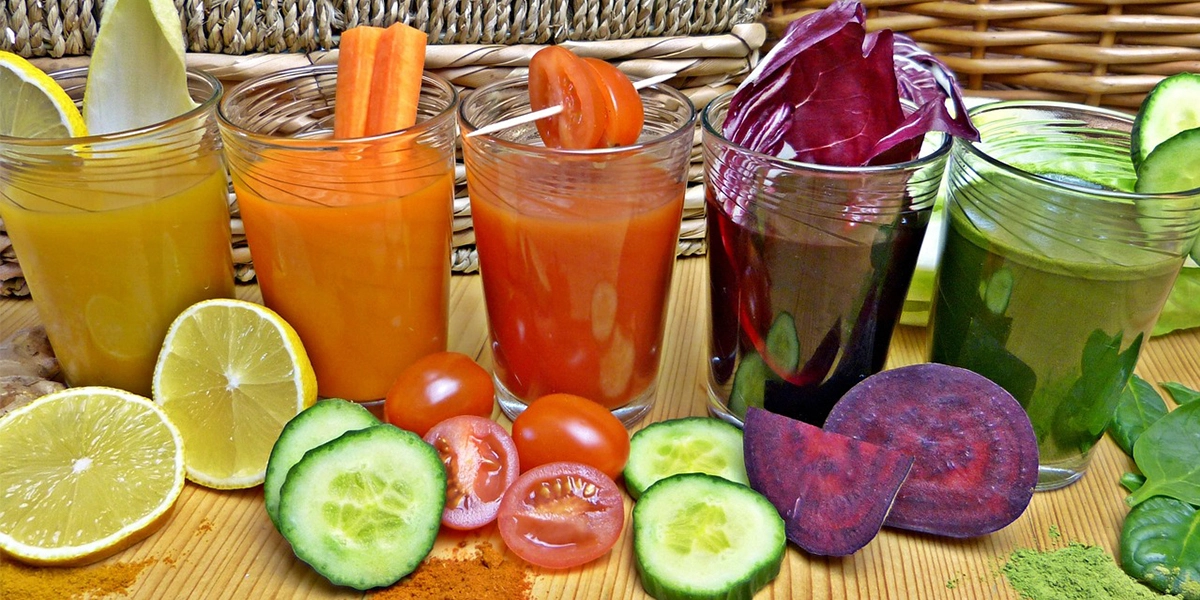Vegetable and fruit juices are popular beverages that have gained widespread recognition for their numerous health benefits and refreshing taste. These juices are rich in essential vitamins, minerals, and antioxidants, making them a great addition to a balanced diet. Vegetable juices, such as carrot, beetroot, and kale, are packed with nutrients that support overall well-being, aid in digestion, and boost the immune system. On the other hand, fruit juices like orange, apple, and berry offer a delightful burst of natural sweetness while providing essential vitamins like vitamin C and fiber. These juices not only quench thirst but also hydrate the body, making them a perfect choice for those looking to maintain optimal health and energy levels. Incorporating vegetable and fruit juices into a daily routine can be a delicious and convenient way to ensure a nutrient-rich diet and promote a healthier lifestyle. However, it’s essential to consume them in moderation, as juices can be high in natural sugars and lack the fiber present in whole fruits and vegetables
Types of Juices for health and Fitness
There are many types of juices that can be beneficial for health and fitness, as they provide essential nutrients, vitamins, and minerals. However, it’s important to note that juices should be consumed in moderation, and whole fruits and vegetables should still be prioritized in your diet.
Here are some popular types of juices known for their health and fitness benefits:
- Green Juice: Made from a combination of leafy green vegetables like spinach, kale, and cucumber, green juices are rich in antioxidants, vitamins (A, C, K), and minerals (iron, calcium). They can help boost immunity, promote detoxification, and provide a burst of energy.
- Beetroot Juice: Beetroot juice is known for its high nitrate content, which can help improve exercise performance and stamina. It also supports heart health and may help lower blood pressure.
- Carrot Juice: Carrots are a good source of beta-carotene, which the body converts to vitamin A. Carrot juice promotes healthy skin, supports eye health, and boosts the immune system.
- Orange Juice: A classic choice, orange juice is rich in vitamin C, which supports the immune system and helps with collagen production for healthy skin. Choose fresh, natural orange juice without added sugars.
- Pomegranate Juice: Pomegranate juice is loaded with antioxidants, particularly punicalagins and anthocyanins, which can help reduce inflammation and support heart health.
- Cranberry Juice: Cranberry juice is known for its ability to support urinary tract health by preventing bacterial adherence. It’s also a good source of vitamin C.
- Pineapple Juice: Pineapple juice contains bromelain, an enzyme that aids in digestion and reduces inflammation. It also provides vitamin C and manganese.
- Watermelon Juice: Watermelon juice is refreshing and hydrating. It contains lycopene, an antioxidant that may benefit heart health and reduce inflammation.
- Grapefruit Juice: Grapefruit juice is rich in vitamin C and may aid in weight management and reducing insulin resistance.
- Acai Berry Juice: Acai berries are high in antioxidants, which can help neutralize free radicals and support overall health.
When consuming fruit juices, try to opt for fresh, homemade juices or those without added sugars and preservatives. Additionally, consider diluting juices with water to reduce their sugar content. While juices can be a part of a healthy diet, it’s essential to maintain a balanced and diverse approach to nutrition, incorporating whole fruits, vegetables, and other nutrient-dense foods. Always consult with a healthcare professional or nutritionist if you have specific health concerns or dietary restrictions.

Different juices According to Seasons for Health
Tailoring your juice choices to the seasons can be a great way to enjoy fresh and locally available produce, while also maximizing the health benefits of the ingredients.
Here’s a list of juices according to different seasons.
Spring –
- Strawberry Cucumber Mint Juice: Strawberries are abundant in spring and are rich in vitamin C, while cucumber adds hydration and mint provides a refreshing taste.
- Carrot Orange Ginger Juice: Carrots and oranges are still available from winter, and the addition of ginger provides a warming and immune-boosting element.
Summer –
- Watermelon Basil Juice: Watermelon is hydrating and cooling, perfect for hot summer days, and basil adds a delightful twist to the flavor.
- Pineapple Coconut Juice: Pineapple provides a tropical sweetness, and coconut water adds electrolytes to keep you hydrated in the heat.
Autumn/Fall –
- Apple Pear Cinnamon Juice: Apples and pears are in season, and cinnamon adds a warm, comforting flavor with potential blood sugar benefits.
- Grape Cranberry Juice: Grapes and cranberries are popular during this season, and their combination results in a tangy and antioxidant-rich juice.
Winter –
- Orange Pomegranate Juice: Oranges are at their best during winter, and pomegranate seeds add a burst of color and antioxidants.
- Beetroot Carrot Celery Juice: Root vegetables like beetroots and carrots are available in winter, and celery adds a touch of freshness to this nutritious juice.
Note :-
It’s important to adapt these suggestions to the specific region and climate you are in, as seasonal availability may vary. When making juices, try to use fresh, locally sourced produce to ensure maximum nutrient content and support local farmers. Additionally, consider using a variety of fruits and vegetables to ensure a diverse range of nutrients in your diet.
Remember that while juices can be a great way to consume fruits and vegetables, they may also concentrate sugars and lack the fiber found in whole fruits and vegetables. So, it’s best to complement your juices with a well-balanced diet that includes whole fruits, vegetables, lean proteins, and whole grains for optimal health benefits.
When making vegetable juices, it’s best to use fresh, organic vegetables and avoid adding sugars or high-calorie additives. Additionally, consider combining different vegetables to create a well-rounded and diverse nutrient profile.
While vegetable juices can be a valuable addition to a healthy diet, they should not replace whole vegetables in your daily meals. The fiber found in whole vegetables is essential for digestion and helps regulate blood sugar levels. Consuming a variety of whole vegetables alongside vegetable juices ensures that you get the maximum health benefits.
Read this Article Also:- Healthy Gas Station Drinks: A Refreshing Choice on the Go
If you don’t like this article/post please share your feedback.





